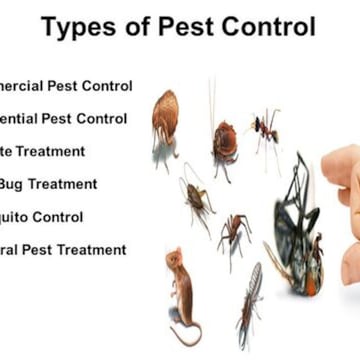More About Pest Control
More About Pest Control
Blog Article
Things about Pest Control
Table of ContentsAll About Pest ControlNot known Factual Statements About Pest Control Get This Report about Pest ControlPest Control - An OverviewThe smart Trick of Pest Control That Nobody is Discussing
Limitations of Chemical Management Be able to assess parasite issues, establish if administration is required, and make appropriate suggestions making use of IPM methods. Be acquainted with different techniques of insect monitoring - their benefits and restrictions.This phase discusses (IPM), a strategy that utilizes understanding regarding parasites and their, techniques, nonchemical methods, and chemicals to handle pest issues. Additional information concerning IPM for details plants is included in chapters that focus on those plants. Nonchemical bug control measures are emphasized in phase 17, "Organic Horticulture." Managing birds and creatures is covered in chapter 20, "Wildlife." Handling in the lawn and garden is covered in phase 6, "Weeds." Parasites in a yard or landscape might consist of insects and mites, weeds,, animals, and birds.
Insects and weeds, nevertheless, play a duty in the. After planting a yard or establishing a grass, the all-natural procedure of plant sequence begins to reestablish and nonnative plants.
What we call "insects" are part of a natural system at the office. An ecological community has no parasites. Only humans consider specific species parasites when they occur where they are not desired. We will be a lot more effective in managing undesirable types when we understand that these microorganisms adhere to predictable patterns that we can make use of to our advantage.
The Definitive Guide for Pest Control
Pests susceptible to a pesticide were promptly killed, leaving resistant ones to breed and increase. It became clear that pesticides alone would certainly not fix all parasite issues. Rather, overuse of pesticides created the advancement of resistant insects. Researchers started to establish a brand-new approach to pest control. This brand-new method was explained as integrated insect management (IPM).
An IPM strategy enables some level of parasites in the atmosphere. Bugs are much less likely to survive a program that uses several methods of decreasing their populaces. Integrated insect management was first suggested by entomologists due to the fact that bugs were the first group of parasites to prove difficult to handle with chemicals alone.
A limit is the point at which activity should be taken. IPM has expanded beyond insects to administration of all pest populations: weeds, disease microorganisms, and creatures.
10 Easy Facts About Pest Control Shown
Management rather than removal of bugs is the goal. An IPM plan starts with a mindful analysis of each bug problem.
Clover expanding in a yard may be seen as an unwanted weed, but as a legume it is manufacturing nitrogen for the dirt and the blossoms are providing nectar to honey bees and various other. Tolerance for some weeds may belong to an IPM plan. may be eating the fallen leaves of a plant, but when they are identified as the larvae of Eastern tiger swallowtail butterflies, their damages may be tolerated so we can enjoy the stunning butterfly.

The second crucial device in pest administration is very early treatment. why not try this out Being existing and watchful in the yard guarantees very early discovery. Responding to troubles quickly, before they have time to multiply, requires a less dramatic intervention. The third essential device is recordkeeping; tracking what happens in the garden makes it possible for a gardener to identify patterns and make educated choices.
The Best Guide To Pest Control
Many safe, functional, nonchemical approaches of plant defense and insect administration might minimize or eliminate the demand to spray. Other methods are most advantageous when used with pesticides. To carry out management practices correctly and to minimize losses, gardeners need to know the kinds of pests that attack plants and recognize pest biology.

Conducting a soil test and applying only the advised quantity of plant food and lime takes full advantage of the benefit to the plant while decreasing issues connected to excessive usage of fertilizer - Pest Control. Treatment the dirt with several inches of compost safeguards the plant in numerous means: decreasing soil water loss to dissipation, reducing weed competition, providing nutrients, and creating a suitable setting for earthworms and bacteria that keep the dirt loose for roots and damage down natural material to release nutrients
If mulch touches the trunk, it can develop a method for voles, microorganisms, and fungi to assault the plant. Do not utilize manure or garden compost that has not thoroughly decomposed as a top clothing since it can urge unfavorable insects. Research study suggests that tilling the dirt is destructive to dirt structure.
What Does Pest Control Mean?
If tilling is regarded required, take into consideration doing it in the fall when the life process of numerous pests brings that site them near the surface area. At the surface, pests become revealed to the climate along with birds and various other natural opponents. Loss tilling can additionally destroy pests in crop deposits. Usage disease-free and insect-free certified seeds and plants if available.
Report this page